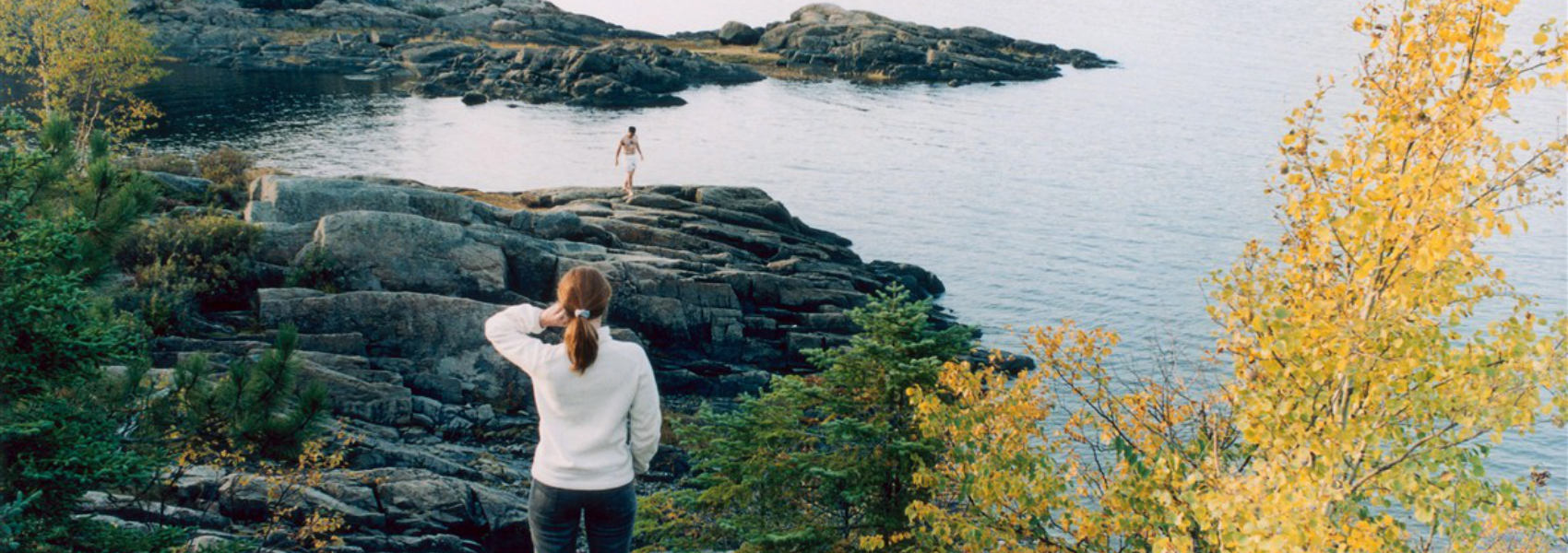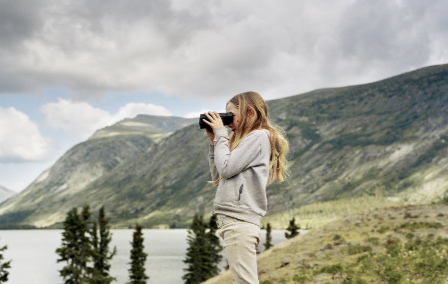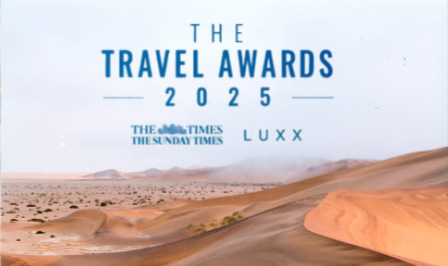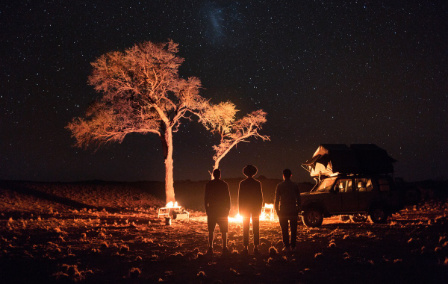
Published 13th Nov. 2025
Reading time
Screens can easily overshadow the travel experience. If that sounds familiar to you, don’t worry – this guide offers over 20 practical ways to unplug, from swapping devices for activities to picking a destination where connectivity naturally fades into the background. Reclaim your attention, strengthen in-person experiences and discover how much more rewarding travel can be without constant digital distractions. For anyone tethered to their devices (no judgement, we’ve all been there), this guide serves as a toolkit and a gentle reminder to live moments rather than scroll past them.
A digital detox is a period of time where you commit to limiting your use of digital devices, or not using them at all. The idea is to reduce your reliance on them so you can rebalance and focus on other goals and activities.
At its most extreme, this means taking a complete break from your phone, tablet and computer. Since this technology is often an essential part of our daily lives, some people choose to do a digital detox when they’re travelling and away from their usual responsibilities.
But you don’t need to lock your phone away in a box for your entire trip (unless you want to) – there’s a gentler way to unplug while you’re on holiday. Your digital detox could be as simple as only checking your phone during set times, taking a break from using social media, or replacing time you would have spent watching TV or a film with a screen-free activity like reading.
Recent research shows 38% of consumers are worried about having too much screen time and would like to try a digital detox, while 41% of households are worried about the levels of screentime in their homes.
Of those who’ve tried a digital detox, many had priorities that were based around real life experiences:
- Spending more time with family (50%)
- Spending time doing other things (49%)
- Having more offline social interactions (36%)
- Improving sleeping patterns (35%)
- Wanting a better work-life balance (32%)

Image by Faustine Poidevin-Gros.
Having access to digital devices throughout the day means we’re constantly connected. And while that definitely has its upsides – loved ones are a mere message away – it also means we can become overstimulated and distracted. We’re always on the alert for the next notification. This has an effect on our nervous systems, increasing levels of the stress hormone cortisol.
Reducing the reliance on our devices frees our minds up to focus on other things. When you’re on holiday, this can mean a whole host of fun: seeing sights you’ve always dreamed of visiting, trying new activities, sampling local food and drink or simply relaxing without any responsibilities to tend to. You can truly enjoy what’s in front of you.
Stepping away from screens can also help you see the patterns you’ve fallen into and what you might like to change about them. You can then decide what new habits you’d like to work towards when you return home from your screen-free adventures.
A digital detox is also thought to have health benefits. Screens emit blue light, which suppresses the production of the sleep hormone melatonin and disrupts our circadian rhythm (i.e. our body clock). This can be an issue at night when we’re trying to drift off to sleep. Not using our devices, or having a cut-off point in the evening, can reduce the chances of this having an effect.

Image by Martin Lopez / Pexels.
1.
Worrying about what we need to do when we get home can stop us from enjoying the present moment while we’re on holiday. You can reduce the risk of this by addressing potential issues before your trip even starts.
- At work, create a handover document or email for colleagues to refer to while you’re away, tie up any loose ends before you go on annual leave and set time aside for catching up on your first day back.
- At home, make sure the space is clean and tidy (future you will be grateful when you get back), and arrange for a trusted friend, relative or neighbour to check in every now and then, sort out your post and water any plants.
2.
Make it clear that you’re on annual leave. Include the date you’ll be back and who to contact for anything urgent that comes up in the meantime. Often, this will prompt the person receiving the out-of-office message to think about whether their query is truly urgent or can wait until you return. Switch off any other work notifications before you log off.
3.
As much as we love them, family and friends can distract us from enjoying ourselves if they message frequently. To lessen the chance of this happening, let them know beforehand that you won’t be in touch as much as normal while you’re on holiday, and consider muting message app notifications so you’re less tempted to look.

Image by Dameli Zhantas/Unsplash.
4.
Keep notifications for apps that you need for your trip (such as airline and weather apps) and mute the rest. It’ll be easier to stay in the present moment if you have fewer notifications to divert your attention. Don’t forget that these notifications are designed to make us notice them, so don’t be too hard on yourself for feeling like you should look at them.
5.
You can’t access an app on autopilot if it’s not there. And, chances are, redownloading it in the moment isn’t going to be worth it. If you’d prefer not to delete apps, you can still set timers for usage. Many phones offer this as standard, blocking access to the app once the time period you set runs out.
6.
Phones, tablets, e-book readers, laptops… we rely on a whole host of technology in our daily lives. But you don’t need them all while you’re away. When you’re packing, think about what you’ll truly need or get the most use out of.

Image by Chengyu Wang / Unsplash.com.
7.
Being intentional about what you want to watch or read while you’re away can be very helpful. Narrowing down your choices means the decision is made for you, and it can also help you choose which devices to bring – booklovers will favour an e-reader (or maybe physical books if you’ve got the space), while film buffs will want a larger screen.
8.
Perhaps this goes without saying when you’re on holiday. But the more you’re looking forward to doing something, the easier it’ll be to stay in the moment while you’re experiencing it, whether it’s a walking trail you’ve always wanted to explore, tasting cuisine you’ve always wanted to try or simply a wander around a new city.
9.
It’s natural to want memories of your trip – looking back at photos can remind you of the amazing things you saw and the good times you had. The act of taking photos can even be mindful if you choose it to be, by carefully considering what you want to capture. But you don’t need to share or upload your photos there and then. Take the pictures you want and then put your phone or camera away, allowing you to get the best of both worlds. Sharing the photos online later, if you choose to, is also safer, as it doesn’t alert people to the fact your home is currently empty.

Image by boby.
10.
We all know the feeling of having a to-do list in our heads. This can distract from what’s going on in front of us, especially when we’re travelling. To reduce the chance of this happening, write out your to-do list before you go and work out what you can tick off before you travel, and what can wait until you get back. This clears up space in your brain for all the fun things you’ve got planned for your trip.
11.
These activities are mindful and can help you enjoy your time away more: walking by allowing you to explore a new place, and journaling by helping you reflect on it and capture the memories onto the page. You might decide to do something else, like reading or meditating, but the thought behind it remains the same – use the time you would have spent on your phone doing something good for your wellbeing.
12.
Some destinations lend themselves more naturally to a digital detox than others. We’ve compiled some of our favourites here, in case you need some inspiration.
The calm of Italy’s countryside offers a welcome reprieve from busy everyday life. Rolling green hills are dotted with rustic villages and vineyards, where the wine flows and the food proves why the country’s cuisine is world-renowned. Slow down and enjoy your surroundings by going for walks and exploring the history, then relax in the shade when the sun is at its peak.

Image by Pexels Dajana Reci.
Canada is vast, with miles and miles of untouched land. The country’s 37 national parks (and 11 further national park reserves) mean you won’t be short of places to explore, whether you take a quiet walking trail or skate on a frozen lake. Let the crisp alpine air fill your lungs and the earthy scent of pine ground you, as the sight of pristine lakes reflects the sky above. The more remote places in Canada may not have wifi, so it’ll be much easier to do a full digital detox if that’s something you’re aiming for.

Image by Pia Riverola.
Thailand is a great digital detox destination for travellers who want to switch off from screens, but don’t want to miss out on the excitement of a city break. There’s a real buzz in Bangkok, with busy streets, mouth-watering street food sitting alongside upscale restaurants, and a sometimes-intense heat (thankfully air-conditioning is easy to come by).
That doesn’t mean you can’t get some much-needed peace. Travel outside the city and replace social media scrolling with the quiet hum of nature as you follow jungle walking trails through tropical national parks, or feel the sand between your toes on a pristine beach.

Image by Olivier Romano.
Japan is a global leader in wellbeing travel, known for its respectful etiquette, hot springs and the calm of its natural wonders . Many of their popular wellness activities encourage a break from technology by their very design – let’s take the hot springs, known as onsen, as an example. To bathe at an onsen, you must store your belongings away; the only things you take with you to the springs are a small towel and your locker bracelet (if it’s a public onsen). This, plus the quiet atmosphere, means you can soak any tension away in the warm waters without distraction.

Image by Pauline Chardin.
India invites you to trade screen time for slow, sensory living. Imagine tea-scented hill stations and mirror-still backwaters in Kerala, or quiet Himalayan valleys and temple towns in Tamil Nadu, where ritual sets the day’s rhythm. Unplugging feels inevitable here, whether you’re learning about spiritual traditions, attending a wellness retreat or staying at a guesthouse that favours conversation over connectivity.

Image by Divyanshu Thapa/Pexels.
A digital detox feels like a natural thing to do in Sweden, where slow living is the order of the day. You can spend a fika-fuelled afternoon relaxing in Stockholm’s cafes, but nature is also never far away – follow peaceful, pine-scented trails, trade doomscrolling for dog-sled runs or kayak across glassy archipelago waters.

Image by Gregor Lengler/LAIF-REA.
Time slows and the world is left behind when you’re in the Maldives. Here, seclusion isn’t a perk – it’s the whole point of visiting. The escapism starts as you arrive, flying above a scattering of coral atolls and islands coated in soft, powdery white sand. Once you land it’s tempting to stay barefoot, as you split your time between snorkelling with turtles, lazing in a hammock and relaxing in the spa.

Image by Carlota Weber Mazuecos.
Warm hospitality and incredible landscapes welcome you as you touch down in Oman. Picture the amber dunes of the Wahiba Sands, cool emerald wadis and the high ridges of the Hajar Mountains. Swap your screens for watching the sunrise or taking a dhow cruise along Musandam’s fjord-like bays, looking for dolphins in your wake. For a true escape, travel to a desert camp where you can sleep under a blanket of stars.

Image by Best Jobers.
We’ve saved the ultimate digital detox for last: Antarctica, home to the South Pole. This vast white land of snow and ice stretches as far as the eye can see, and beyond, and many consider visiting to be a bucket-list experience. You’ll have the chance to see enormous glaciers and ice shelves, watch penguin colonies potter about and observe beaches covered with elephant seals. The scale is both breathtaking and humbling, and with no wifi distractions, it’s a chance to practise being truly present.

Image by Daria Nikitina.
Despite all of the best plans, it’s likely you’ll feel tempted by the pull of your devices when you’re on holiday. After all, they’ve become so integral to our daily lives and we may even feel more reliant on them when we’re in an unfamiliar place where we don’t always know the language. To stay committed to your digital detox, here’s how to overcome some of the key challenges:
- Needing your phone for practical reasons. To prevent you from relying on the internet, you can plan ahead and download any routes, contact details and other information (such as key phrases in the local language) you may need. That way you’ll feel equipped with knowledge without needing to pick up a device.
- Worrying about what’s happening while you’re away from work. You might be concerned about the quality of the work being done, or about co-workers resenting your absence. But everyone needs and deserves a break from time to time, and you can’t control what others do or think. Ultimately, as long as you’ve left a helpful handover for your holiday and communicated your boundaries clearly, you’ve done what you can.
- Feeling guilty for not unplugging completely. For some, switching their phone off for the entire trip is manageable. But for most of us, that’s not realistic – our phones can be our maps, wallets and cameras, after all. Instead, focus on stopping absent-minded scrolling and staying in the present moment.
- Falling back into old habits. It takes time to get used to new ways of doing things, but there are things you can do to help yourself. For example, you might set yourself a specific goal, like only spending a set amount of time per day scrolling, so you know exactly what you’re working towards.
- Not knowing what to do instead. It’s easy to replace scrolling with fun activities while you’re travelling, but some people struggle with what to do during their downtime. This is a great opportunity to try new hobbies and figure out which ones you want to incorporate into your daily routine back home. You could also join a tour, which gives you the chance to chat with like-minded people.
A digital detox is designed to refresh you both physically and mentally. Embrace the chance to switch off and enjoy all the adventures and experiences travel can bring.

Image by Grant Harder.
Header image by Frank Tophoven/LAIF-REA.
Practical advice and inspiration for your next trip

A new pattern of travel planning is emerging. Gone are the days of the traditional two-to-three-month lead time – jet setters are now falling either side of the spontaneity spectrum. While last-minute bookings are booming, so are future trips as far away as 2030 (to catch the solar eclipse in Namibia, if you’re curious). We’ve dubbed this phenomenon the Concertina Effect, reflecting both the new stretched and squeezed booking windows.
18th August 2025 - Travel Trends

Last week, we were delighted to learn that we have been nominated for the ‘Best Luxury Tour Operators’ category in The Times and Sunday Times Travel Awards 2025. While we’re honoured to have been nominated for the fourth year on the trot, it would be fantastic to come out on top this year: so, if we’ve had the pleasure of crafting an unforgettable holiday for you, we’d love it if you would vote for us.
5th August 2025 - Travel Trends

Calling all night owls – the late shift just got a whole lot more interesting. Dubbed ‘Noctourism’, this new nocturnal travel trend is all about exploring destinations beyond their cocktail bars and casinos. From stargazing in Spain to night hikes in the Costa Rican jungle, there’s a whole world to discover after the lights go out. Torches at the ready? Let’s hope you’re not afraid of the dark... Stargazing in Spain Jungle hiking in Costa Rica Night safari in Botswana Bioluminescence in Cambodia Petra by candlelight Stargazing in Spain Thanks to light pollution in urban areas,
5th June 2025 - Travel Trends

Our team of destination experts will get to know you and your unique requirements for your holiday

We work with you to build an ultra-personalised holiday itinerary with your choice of accommodation, experiences and activities

All of our holidays include little extras designed to make a big difference to your trip, from fast-tracking you through airport check-in and security to our network of local Concierges